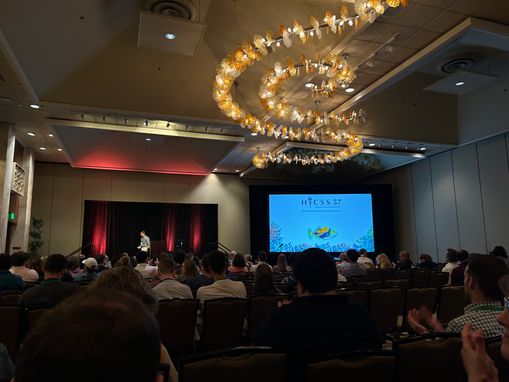
- SAP Community
- Groups
- Interest Groups
- SAP Learning Groups
- Beginner Corner
- Blog Posts
- SAP and Information Systems Research: Reflections ...
- Subscribe to RSS Feed
- Mark as New
- Mark as Read
- Bookmark
- Subscribe
- Printer Friendly Page
- Report Inappropriate Content
A tropical setting and an assembly of leading scholars and professionals are what encapsulate the essence of this year's Hawaii International Conference on System Sciences (HICSS). The annual HICSS serves as a global platform for researchers, scholars, and practitioners to share insights, foster collaboration, and discuss the latest developments in system sciences. As one of the largest and most prestigious Information Systems conferences, HICSS drew approximately 1300 scientists and 760 research papers. Notably, the two SAP-affiliated researchers contributed to the conference and presented two research papers on adopting Artificial Intelligence (AI) in business networks – whereas one paper was even nominated for the Best Paper Award.
Artificial Intelligence at the Core of Industrial Innovation
The conference revolved around several important themes, including advances in information technology, decision analytics, collaborative systems, and AI. This year, the role of AI in the future of industry has taken center stage. In his keynote, Dr. Christopher Nguyen, Co-Founder of Aitomatic – a leading tech company specializing in industrial generative AI - provided insights from firsthand experiences. Dr. Nguyen delved into real-world applications, showcasing the transformative power of AI and elucidated how AI transforms work dynamics. He emphasized a strategic approach, focusing on the ethical considerations surrounding AI deployment with the need to prioritize human-centric values, and stressed the importance of upholding ethical standards and core human values.
The Adoption of AI within Business Networks
In collaboration with the Technical University of Munich (TUM), two SAP-affiliated researchers had the opportunity to present their research on the organizational adoption of the emerging technology “Federated Machine Learning” at the conference. They first delved into the challenges and influencing factors for the successful adoption of Federated Machine Learning and then demonstrated a decision-support tool for the technology selection process.
Working at the intersection of AI and collaborative business networks, the researchers presented a comprehensive overview of influences, stressing the importance of four pivotal factors:
- Collaboration Management
- Organizational Readiness
- Data Quality
- Data/System Interoperability
Effective collaboration management ensures smooth coordination among participants, while organizational readiness measures the preparedness of a company to embrace collaborative Machine Learning. Data and system interoperability facilitate the seamless integration of diverse datasets and technologies, fostering a collaborative environment. Finally, the importance of data quality cannot be overstated, as it directly influences the accuracy and reliability of AI outcomes.
Building on these insights, the researchers continued to demonstrate a decision-support tool designed to support practitioners throughout the intricate technology selection process for Federated Machine Learning. By offering a structured framework, they empower decision-makers to evaluate suitability and complexity, considering the most crucial success factors. Moreover, the tool extends its utility to assess organizational readiness, ensuring that the chosen technology aligns with the organization's capabilities and objectives.
SAP at the Forefront of Innovation
Engaging in conferences and fostering collaborative endeavors with leading research institutes is a crucial driver to staying at the forefront of the fast-paced realm of technological innovation. Access to cutting-edge research, emerging talent, and a continuous learning environment ensures that SAP remains adaptive and well-positioned for the future. Notably, these publications and contributions to HICSS resulted from the SAP@TUM collaboration.
Hereby, SAP and TUM collaborate under the Industry-on-Campus strategy, fostering a mutually beneficial partnership. At the heart of this alliance is the SAP@TUM Collaboration Lab, a joint initiative facilitating applied research, knowledge exchange, and co-innovation. The collaboration provides a platform for SAP employees and TUM members to gain insights into ongoing projects, scientific research, and the vibrant work environment at SAP.
SAP University Alliances
SAP also maintains close relationships with universities around the world. Over time, we have built a global academic community, consisting of nearly 3 thousand-member institutions in 115 countries. This program is called the SAP University Alliances Program and is meant to enable academia to inspire‚ and educate the next generation of talent and to collaborate on impactful and innovative research together. Especially for the latter, there are central efforts to keep the experienced researchers who are already involved in collaborative projects in the SAP ecosystem and to retain their expertise and let it flow back into the organization. You can find more information about this in the SAP Research Community.
On top of that, we deliberately point towards job opportunities for students and graduates at SAP or at SAP partners and customers.
- SAP Managed Tags:
- SAP University Alliances
You must be a registered user to add a comment. If you've already registered, sign in. Otherwise, register and sign in.
-
Artificial Intelligence (AI)
2 -
artificial intelligence AI
1 -
beginner corner
4 -
Beginner Corner Discussions
4 -
Business Partner
3 -
Career Development
4 -
Careers
17 -
Certification
14 -
Courses
14 -
learning activities
3 -
Learning Content
3 -
quick start guide
3 -
research
3 -
SAP learning
2 -
SAP Next-Gen
1 -
SAP successfactors
2 -
SAP University Alliances
1 -
Skills and Learning
4 -
Where to start
21
| User | Count |
|---|---|
| 2 | |
| 1 | |
| 1 | |
| 1 | |
| 1 | |
| 1 | |
| 1 | |
| 1 | |
| 1 | |
| 1 |




